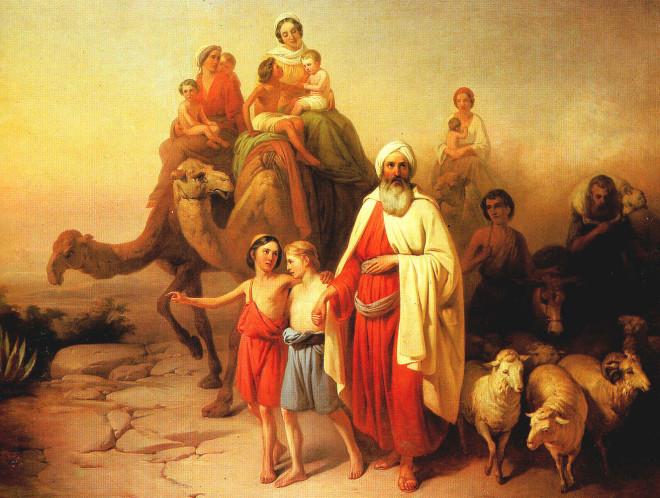We read a lot about the great father of many nations, the patriarch Abraham, who lived on the earth about 1,948 years after Adam. [His birth: c. 1813 BCE and death: c. 1638 BCE.] You can’t appreciate all that Abraham suffered and accomplished unless you include his wife, Sarah. She was equal in all things, even though we don’t have many written accounts of her life.
I’m reading a book I’ve had around for a while — Traditions About the Early Life of Abraham, vol. 1 compiled by John A. Tvedtnes, Brian M. Hauglik, John Gee:
I came across information about Sarah in this book which quotes a book called, Extracts from the Midrash Rabbah. According to this reference, Sarah was proselyting with Abraham to gather or “convert” souls to go with them when they left Haran. At this time in history, the Lord had told Abraham to leave his homeland and his father’s house and get to a new land. Abraham was 75 years old:
Now the LORD had said unto Abram, Get thee out of thy country, and from thy kindred, and from thy father’s house, unto a land that I will shew thee: (Genesis 12:1)
Genesis
Abraham made proselytes, for it is written, And Abraham took Sarai his wife…(77) and the souls that they had made in Haran. (78). R. Eleazar observed in the name of R. Jose b. Zimra: If all the nations assembled to create one insect, they could not endow it with life, yet you say, “And the souls that they had made in Haran!”
It refers, however, to the proselytes. Then let it say, “That they had converted”: why, “Which they had made”? That is to teach you that if one brings a proselyte near [to God] it is as though he created him. Now let it say, “That he had made”; why “That they had made”? Said R. Hunia: Abraham converted the men and Sara the women.” (74) (2:771) (Traditions, p. 102)
Sarah goes out and converts the women or gathers them according to this interpretation. Sarah is as much a proxy savior as Abraham. They are the typical King and Queen — the role which comes to light again in the last days of gathering.
Song of Songs 1:3.3
And Abram took Sarai his wife and Lot his brother’s son and all their substance that they had gathered and the souls that they had made [E.V. “gotten”] in Haran. (Citing Genesis 12:5)…what it [the word “made”] meads, therefore, is the proselytes whom Abraham and Sarah converted. Therefore it is said, And the souls which they made in Hara. R. Hunia said: Abraham used to convert the men and Sarai the women.
Then why is it stated, “which they made in Haran?” It teaches that Abraham our father used to bring them into his house and give them food and drink and be friendly with them and attract them and convert them and bring them under the wings of the Shechinah. You learn from this that if a man brings one creature under the wings of the Shechinah, it is accounted to him as if he had created him and formed him and moulded him. (Songs of Songs, 9:38-39) (Traditions, p. 116)
This same story is told in the book of Abraham (The writings of Abraham while he was in Egypt, called the Book of Abraham, written by his own hand, upon papyrus.)
And I took Sarai, whom I took to wife when I was in Ur, in Chaldea, and Lot, my brother’s son, and all our substance that we had gathered, and the souls that we had won in Haran, and came forth in the way to the land of Canaan, and dwelt in tents as we came on our way; (Moses 2: 15)
Sarah was actively involved in this exodus — gathering the souls, the other women, and children who were of one heart who believed that they should leave with Abraham. Women will be actively involved in the last days’ exodus as well. They will be proxy saviors who intercede with God for others:
Although many ancient persons whom Isaiah cites as messianic types served as saviors to their people, so do endtime persons who act as proxy saviors under the terms of the Davidic Covenant. All who suffer for the sake of those to whom they minister and who intercede with God on their behalf are in that sense messiahs in their own right.(Endtime Prophecy, Avraham Gileadi,p. 171)
If you look closely, you will find more examples of women like Sarah who become “queens,” “saviors,” or “servants” of God:
Isaiah’s “kings” and “queens” of the Gentiles who minister to God’s people, Obadiah’s “saviors on Mount Zion,” Daniel’s “saints of the Most High [God],” and John’s “144,000 servants of God” all perform messianic functions in restoring God’s endtime people. (Endtime Prophecy, Avraham Gileadi,p. 171)
Originally published 2016, updated May 2021.



